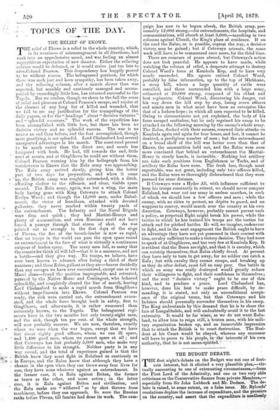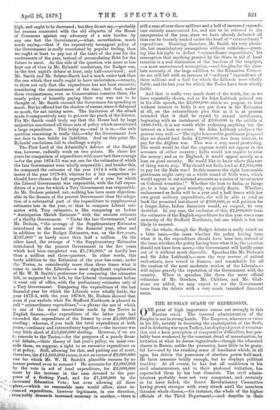THE BUDGET DEBATE.
rpHE first night's debate on the Budget was not one of first- J_ rate interest, but it elicited 'a very plausible plea,—vir- tually amounting to one of extenuating circumstances,—from the First Lord of the Admiralty, and one or two very able criticisms on the Conservative finance from private Members,— especially from Sir John Lubbock and Mr. Dodson. The de- bate is raised, to some extent, on a false issue. Mr. Bylands' resolutions deplore the increase of expenditure, and the pressure on the country, and assert that the expenditure is needlessly
high, and ought to be decreased; but they do not say,—probably for reasons connected with the old etiquette of the House of Commons against any advocacy of a new burden by any one but the Government,—what, nevertheless, much needs saying,—that if the expensively termagant policy of the Government is really sanctioned by popular feeling, then we ought at least to pay out of the taxes of the year for the excitements of the year, instead of accumulating Debt for the future to meet. As this side of the question was more or less kept out of view in Mr. Rylands' resolutions, the Budget was, in the first night's debate at least, only half-considered ; and Mr. Smith and Mr. Sclater-Booth had a much easier task than the one which they really ought to have undertaken,—namely, to show not only that the expenditure has not been excessive, considering the circumstances of the time, but that, under these circumstances, even as Conservatives conceive them, the manly policy of honestly paying their way was not to be thought of. Mr. Smith excused the Governmen for spending so much. But he offered but the shadow of excuse, since it did spend so much, for not raising more. The limitation of the attack made it comparatively easy to get over the pinch of the defence. For Mr. Smith could truly say that the House had by large majorities sanctioned all those acts of policy which necessitated a large expenditure. This being so,—and it is so,—the only question remaining is really this,—why the Government does not dare to face boldly its liabilities. And on this point Mr. Rylands' resolutions fail to challenge a reply.
The First Lord of the Admiralty's defence of the Budget was, however, radically weak on two points. He chose his years for comparison of expenditure with more tact than courage —for the year 1874-75 was not one for the estimates of which the late Government were wholly responsible ; and besides this, he compared the estimates of the year 1874-5 with the esti- mates of the year 1879-80, whereas for a fair comparison he should have chosen the full expenditure of a year for which the Liberal Government was responsible, with the full expen- diture of a year for which a Tory Government was responsible. As Mr. Dodson pointed out, nothing has been more objection- able in the finance of the present Government than the relega- tion of a substantial part of the expenditure to supplemental estimates late in the year, so that to compare Liberal esti- mates with Tory estimates, is like comparing an Indian " Anticipation Sketch Estimate " with the anxious estimate of a thrifty Government. " Under the late Government," said Mr. Dodson, " the average of the Supplementary Estimates introduced in the course of the financial year, after and in addition to the Budget Estimates, was, on the five years, £527,000 " or barely more than half a million. On the other hand, the average of " the Supplementary Estimates introduced by the present Government in the five years which had been completed was £1,746,000," or hardly less than a million and three-quarters. In other words, this tardy addition to the Estimates of the year has come, under the Tories, to considerably more than three times what it came to under the Liberals—a most significant explanation of Mr. W. H. Smith's preference for comparing the estimates left, or supposed to be left, by the Liberal Government before it went out of office, with the preliminary estimates only of a Tory Government. Comparing the expenditure of the last financial year for which the Liberals were wholly liable, the year 1872-3, with the year 1878-9, Mr. Dodson showed that even if you exclude what Sir Stafford Northcote is pleased to call " extraordinary expenditure,"—a phrase the use of which is one of the worst innovations made by the Tories in English finance,—the expenditure of the latter year had exceeded thei expenditure of the former by over £9,000,000 sterling ; whereas, if you took the total expenditure of both years,—ordinary and extraordinary together —the increase was very little short of £13,000,000 sterling. However, if we are to concede to the Tories,—for the purposes of a purely finan- cial debate,—their theory of last year's policy, we must con- cede them, we suppose, a right to an excessive expenditure on ti at policy. Still, allowing for this, and putting out of court, therefore, the £13,000,000 excess, is not an excess of £9,000,000 one for which Mr. W. H. Smith's plausible excuses by no means pretend even to account ? He accounts for £2,000,000 by the vote in aid of local expenditure, for £2,000,000 more by the increase in the sum devoted to the pur-
• poses of a Sinking Fund, and for £1,500,000 by the : increased Education Vote ; but even allowing all these v.pleas,—which no reasonable man would allow, since in- - - created expenditure, however legitimate, in one direction, reascnably demands increased economy in another,—there is still a sum of over three millions and a half of increased expendi- ture entirely unaccounted for, and not to be referred to the emergencies of the year, since we have already deducted all that can be decently ranked under the head of " extraordinary " expenditure. Granting, therefore, Mr. Smith his very plausi- ble, but unsatisfactory assumptions without criticism,—grant- ing him his right to deduct "extraordinary expenditure," his assumption that anything granted by the State in aid of local taxation is a real diminution of the burdens of the taxpayer, —a most unwarranted assumption,—and his plea for the abso- lute necessity of the large addition to the Education Vote,— we are still left with an increase of " ordinary " expenditure cf three millions and a half for which the Liberals were wholly liable, and the last year for which the Tories have been wholly liable.
And that is really very much short of the truth, for, as we have repeatedly shown, and as Sir John Lubbock pointed out in his able speech, the £2,000,000 which we propose to lend without interest to India is not put down in the Estimates at all, on the extraordinary plea that as it is at present intended that it shall be repaid by annual instalments, beginning with an instalment of £300,000 in the middle of 1880-1881, it is not worth while reckoning anything but the interest on a loan so secure. Sir John Lubbock analysed the process very well:—" The right honourable gentleman proposed that we should lend India £2,000,000, free from interest, to pay for the Afghan war. This was a very novel proceeding. The result would be that the expense would not appear in the accounts of either country ; India would not require to raise the money ; and as to England, it would appear merely as a loan on good security. He would like to know where this sort of thing was to stop. Why should not India lend us £2,000,000 to pay for the Zulu war ? In this manner the right honourable gentleman might carry on a whole round of little wars, which would appear in our national accounts as a series of investments on Colonial securities!" Whether the loan to India, as things go, be a loan on good security, we greatly doubt. Whether, embarrassed as India will be a year and a half hence with her own great military expenditure, she will be able to send us back the promised instalment of £300,000, or will petition for a longer delay, Indian financiers would, we suspect, be very doubtful. In any case, the exclusion of this £2,000,000 from the estimates of the English expenditure for this year was a ruse unworthy of Sir Stafford Northcote, but one which is but too likely to succeed.
On the whole, though the Budget debate is really raised on a false issue,—the issue whether the policy having been what it is, the expenditure should have been less, instead of the issue whether, the policy having been what it is, the taxation should not have been more,—the Government will hardly come out of it without much discredit. Speeches like Mr. Dodson's and Sir John Lubbock's,—men the very reverse of radical enthusiasts, men versed in finance, and remarkable for all the caution of the most moderate section of the Liberals,— will injure gravely the reputation of the Government with the country. When to speeches like these the more official criticisms of Mr. Goschen, Mr. Childers, and Mr. Glad- stone are added, we may expect to see the Government issue from the debate with a very much tarnished financial name.



































 Previous page
Previous page